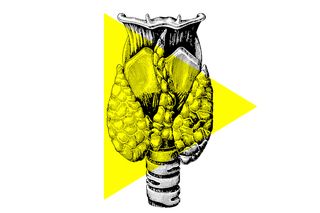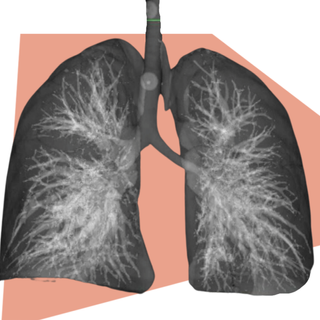
All You Need to Know About Hypothyroidism
An underactive thyroid is a common condition that causes all bodily functions to slow down.

The thyroid gland is a small butterfly-shaped gland that sits in front of the neck. It helps regulate how and where the body uses energy. When it works well, we never know it’s there. When it malfunctions, it’s often difficult to pinpoint, because the whole body is affected. Hypothyroidism occurs when the thyroid gland becomes underactive, causing all of the body’s functions to slow down.
Women are most prone to having thyroid disorders, but anyone of any sex or age can develop them. In India, hypothyroidism is the most common thyroid disorder, with 1 in every 10 adults displaying an underactive thyroid. The prevalence in India is much higher than most other parts of the world, due to the country’s long-standing and widespread iodine deficiency — for iodine is essential for making thyroid hormones.
What is hypothyroidism?
Hypothyroidism is a common disorder in which the thyroid gland, located at the base of the neck, does not make enough thyroid hormones. Thyroid hormones travel through the bloodstream to affect the proper function of nearly every part of the body, be it the central organs such as the heart and stomach, or the brain, or the skin.
The hormone controls the body’s metabolism, i.e. how a body’s cells use energy from food. Metabolism is a set of chemical reactions that are essential to sustain life. The process affects how fast a person burns calories and thus, their temperature and heartbeat. So, when the body doesn’t have enough thyroid hormone metabolism becomes sluggish which makes the body processes slow down.
Who is at risk of hypothyroidism?
Hypothyroidism most commonly affects middle-aged and older women. People who have a history of thyroid diseases in their family or have an autoimmune disease and women over 60,or those who have had a baby in the past 6 months are the most at risk.
However, anyone of any age can develop the condition, including men, infants, and teens.
Related on The Swaddle:
The Postpartum Complication Often Mistaken for New‑Mom Stress, or Postpartum Depression
What are the symptoms of hypothyroidism?
Hypothyroidism is sometimes difficult to identify as its symptoms are vague and can mimic other conditions. They develop slowly over a period of time, often as long as a couple of years. The signs of an underactive thyroid gland vary from person to person, depending on the severity of the hormone deficiency and the length of the time the body has been deprived of the hormone.
The earliest symptoms of the condition can include weight gain and fatigue. But because older people vulnerable to hypothyroidism are also prone to these symptoms, they might not associate it with their thyroid gland’s health. Other common adult symptoms include:
- Constipation
- Dry hair and hair loss
- Dry skin
- Elevated cholesterol
- Puffy, sensitive face and greater sensitivity to cold
- Joint pain, stiffness, and swelling
- Depression
- Changes in the menstrual cycle
- Impaired memory
- Muscle weakness
- Swelling of the thyroid gland
- Slowed heart rate
Some babies are born without a thyroid gland or with a gland that doesn’t work properly. They may have the following symptoms:
- Yellowing of the skin and whites of the eyes (jaundice)
- Difficulty breathing
- Hoarse crying
- An umbilical hernia
- Constipation
- Poor muscle tone
- Excessive sleepiness
Children and teens who develop the condition display the same signs adults do, but they may also experience:
- Poor growth, resulting in short stature
- Delayed development of permanent teeth
- Delayed puberty
- Cognitive delays
What causes hypothyroidism?
The most common cause of hypothyroidism is Hashimoto’s thyroiditis, an autoimmune disorder. A form of inflammation caused by a person’s own body system, in the disorder the body produces antibodies that attack and destroy the thyroid gland. Hypothyroidism can also be caused due to thyroiditis, an inflammation of the thyroid gland.
Treatments for other thyroid problems can also lead to hypothyroidism. Several conditions such as hyperthyroidism (an overactive thyroid gland), goiters, thyroid nodules, and thyroid cancer can be treated by partially or fully removing the thyroid gland, which may result in underproduction of the hormone.
Certain drugs can also interfere with proper thyroid hormone production. And an impaired pituitary gland, which must function properly in order for the thyroid gland to be able to produce the correct amount of thyroid hormone, can also cause hypothyroidism.
Can hypothyroidism be treated or cured?
Hypothyroidism, once it develops, is a lifelong condition and cannot be cured. But for many people, taking medication reduces or alleviates symptoms by improving hormone production. Once adequate hormone levels are restored, symptoms of the condition are likely to disappear or at least become much more manageable.
However, it can take several weeks before treatment has an effect. In most cases, people with hypothyroidism must remain on this medication their entire lives.
Satviki Sanjay is an editorial intern at The Swaddle. She's currently studying philosophy at Miranda House. When not studying, she can be found writing about gender, internet culture, sexuality, technology, and mental health. She loves talking to people, and you can always find her on Instagram @satvikii.
Related


Breakthrough Study Finds CT Scanning Can Detect Most Lung Cancer Cases Early
